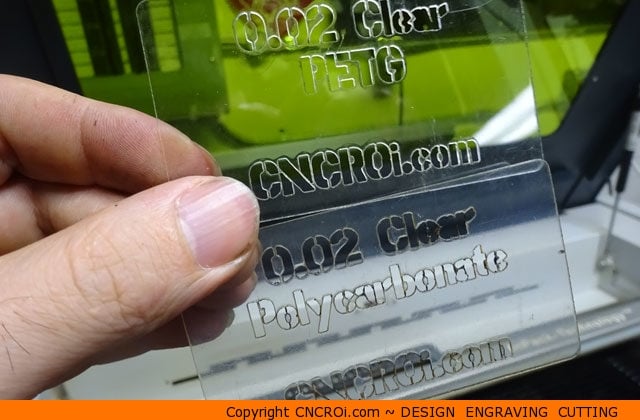PETG vs Polycarbonate: Material Review
PETG and Polycarbonate share very similar properties, today at CNCROi.com, we’ll review why one is better than the other for most applications.
Strength Options (protection for safety applications)
When it comes to strength, there are four options to keep employees and equipment from being broken during an accident. Plate glass, acrylic, polycarbonate and PETG. The advantage of acrylic is that it’s relatively cheap with lots of different tints and colors, but it will shatter quite easily and degrade in industrial application, so that material is out. The advantage of plate-glass is that it’s very strong but can be rather heavy in solid thicknesses and hard to work with, which is why it has been used in the past.
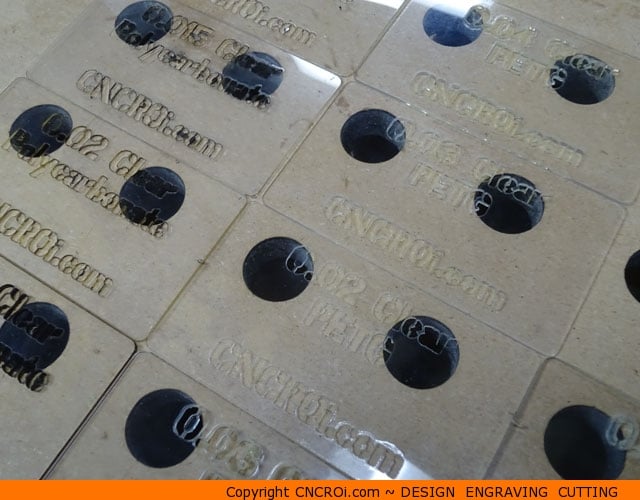
Now, we are onto PETG and polycarbonate. Polycarbonate is 200x stronger than glass, it’s bullet proof glass, and PETG follows polycarbonate about 70% strength wise so it isn’t bad. Both are transparent (though frosty is possible), both are relatively light weight and easy to work with. The reason, especially for thicker applications, that PETG wins out on polycarbonate is cost. It’s a bit less expensive than polycarbonate.
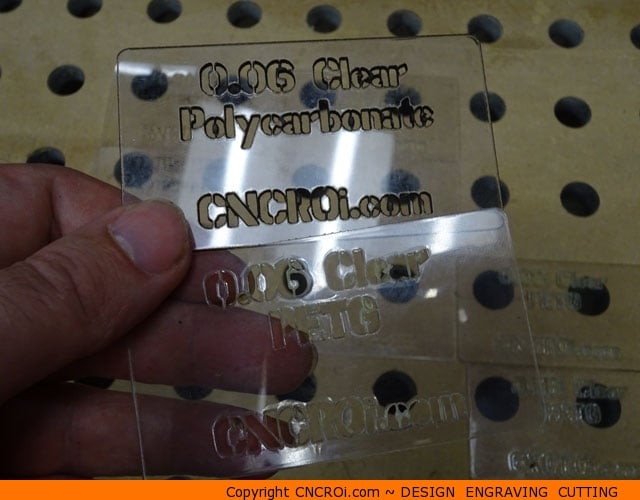
Edge Quality
Like plate-glass, clear acrylic and PETG, when it’s laser cut, the edge quality are all the same, a nice smooth flame polished finish. Polycarbonate on the other hand is like running your fingers across a 320 grit sandpaper that’s dark grey to black. In the thinner gauges, you don’t really see this but as you go thicker, it becomes more pronounced.
This is an important distinction, because of this sand paper like finish on thicker polycarbonate, it does something that PETG does not. It doesn’t melt back onto itself! The way our industrial Austrian wide-format laser is essentially a controlled high-energy beam that’s incredibly hot, we aren’t really cutting through the plastic as much as vaporizing it on the spot.
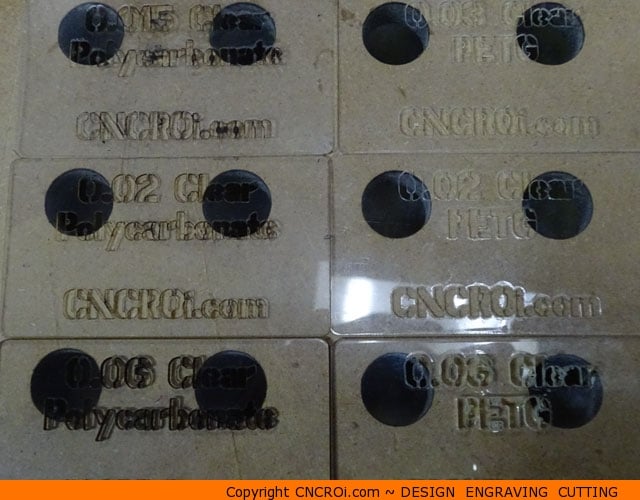
When it comes to PETG especially, the heat tends to stay in the material and the bits you cut apart tend to want to come back together. This makes very fine work difficult. In fact, unlike acrylic, PETG and polycarbonate need to be left on the bed to cool down as they can get incredibly HOT!
None of these issues exist with polycarbonate.
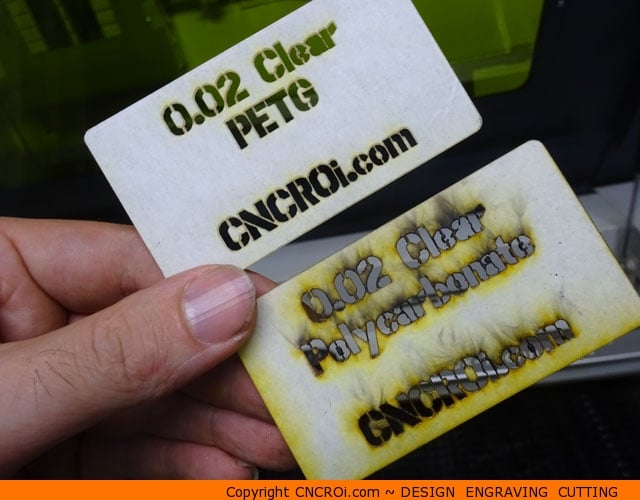
Bendability
Both polycarbonate and PETG are bendable, but after production with heat, I’ve found that the PETG gets extremely brittle on fine details such as cutting out hands. The fingers on the hand in polycarboante would bend on the thinner gauges but with PETG, they are more prone to just shatter, just something to keep in mind if you have very fine details.
A small detail but during production, polycarbonate is far more messy than PETG, the smoke it produces when vaporized is thick and black while with PETG, it’s a lighter color. This isn’t an issue though due to our set-up and the fact that we leave the protective masking on both sides during production (no clean-up required) but just a way to easily differentiate between the two if you ever see these being cut by a laser.
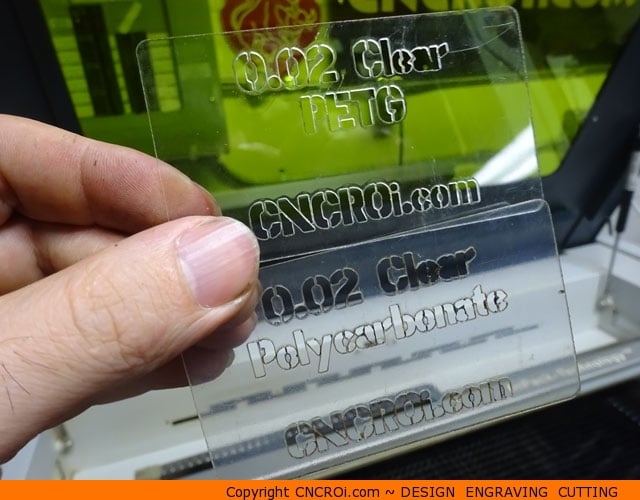
Thicknesses Available
We are able to acquire and work with a huge variety of thicknesses in both PETG and polycarbonate, same goes with acrylic by the way. Keep in mind that your application will dictate the thickness you need but generally, even thin gauges of either material are incredibly resilient and strong for most customer needs.
Another advantage with polycarbonate is that we can color change the surface permanently using our fiber laser source, our Austrian CNC has both CO2 (for cutting) and fiber for changing surface properties.
Polycarbonate does get more expensive at higher thicknesses than PETG but my suggestion, from extensive experience with both materials, is to just go with the polycarbonate as the cost is trivial in the grand scheme of things.
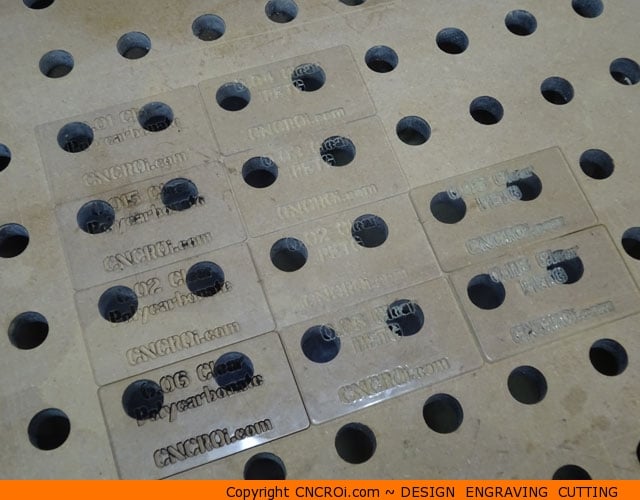
As for applications, polycarbonate is by far my favorite when it comes to making custom stencils, it’s incredibly light weight, can be rolled-up when not in use, can be easily cleaned-up and is borderline indestructible to boot!
Looking for a company to cut your PETG or Polycarbonate regardless of thickness (we can CNC router thicker gauges)? Contact CNCROi.com right now!

